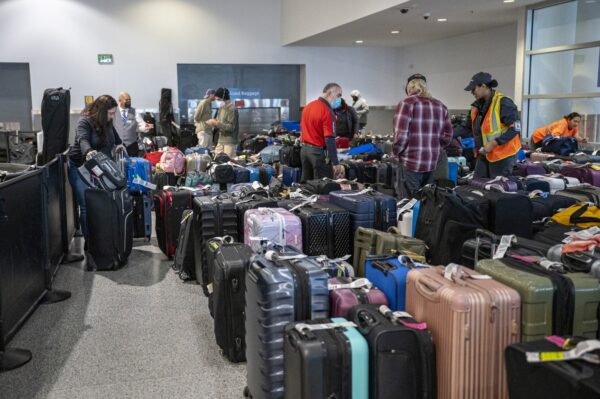By Mackenzie Hawkins
Thousands of US travelers who found themselves and their luggage stranded in airports across the country this holiday season are entitled to compensation, but they may have to wait weeks for the money to arrive.

The chaos primarily affects customers of Southwest Airlines Co., which has canceled thousands of flights since last week in a meltdown caused by outdated technology and a major winter storm.
Under federal law, US air travelers are entitled to the full value of canceled flights, either through a refund or rebooked travel, as well as reimbursement for lost luggage and compensation for being bumped from an overbooked plane. But they have to be persistent: It normally takes up to two weeks for airlines to process compensation claims, said Katy Nastro, spokesperson for deal site Scott’s Cheap Flights. In a scenario affecting this many people, a month would be “quick.”
“If you’re looking for a cash refund, it’s going to be quite a bit of time until you see that. But don’t give up,” Nastro said. “Because this is such a visible and highly public scenario, you should feel confident that you are more likely to get what you’re owed.”
Here’s what that could look like:
Canceled or Delayed Flights
Under federal law, airlines aren’t required to reimburse passengers for delays, book them on another airline’s flight or compensate them for tickets purchased with another carrier. However, many offer at least some of these services voluntarily for controllable delays.
For “significantly delayed” flights — a phrase the Department of Transportation has not specifically defined — passengers may be entitled to a refund in some circumstances, determined by the department on a case-by-case basis using factors such as the length of the flight, length of delay and the traveler’s specific circumstances.
For cancellations, most airlines will rebook passengers on the next available flight — and some have agreements with other airlines to rebook with them at no additional cost to the passenger. (Southwest doesn’t have any such partnerships.)
If passengers choose to call off their trip due to a canceled flight, they are entitled to a full refund for unused transportation, including seat and baggage fees, even for non-refundable tickets. Airlines are also allowed to offer vouchers for future travel, but passengers should make sure they understand the limitations of that credit before accepting it, Nastro said — and know they have the right to a cash refund even if the airline initially offers a voucher.
Southwest has set up a travel disruption webpage for travelers to request refunds. Passengers of other airlines should contact their customer service lines directly, Nastro said. She recommends that passengers do their best to wait out long hold times in order to get their claims processed as quickly as possible.
All other costs are the passenger’s responsibility under federal law. Airlines are not required to reimburse travelers for lost wages or vacation expenses like a cruise or concert tickets. They also aren’t required to provide lodging, food or ground transportation, but many — including Southwest — have publicly committed to provide those services to passengers affected by controllable cancellations or delays.
Specific to this case, Southwest has said it will “honor reasonable requests for reimbursement for meals, hotel and alternate transportation” for travelers impacted by cancellations or significant delays from Dec. 24 and Jan. 2.
Travel insurers also shoulder many of those costs, said Sally French, a travel expert at NerdWallet. And some passengers who didn’t separately purchase insurance may already have it through their credit cards if they used those accounts to finance their trip.
Lost, Damaged or Delayed Luggage
If a passenger’s bag doesn’t make it to their destination intact, they should file a claim with their carrier as soon as possible, the Department of Transportation says. Southwest passengers can file a baggage report here.
“The airline is responsible for locating your bag, and once they have that claim in the system, then they can start processing it,” Nastro said. “Unless they have that claim in the system, they can’t start working on anything.”
Airlines are required to reimburse customers for damaged or lost baggage, with a maximum liability of $3,800 for domestic flights and about $1,800 for international flights. Those same limits apply to expenses incurred due to delayed luggage — and airlines are not allowed to set a daily spending limit for things like clothing and toiletries that customers may need to purchase.
Nastro emphasized that customers should keep all receipts — for the original plane ticket, as well as travel expenses to and from the airport, food and toiletries — in order to demonstrate the financial impact of airline issues.
For lost or damaged assistive devices like wheelchairs, crutches and prescription medications, airlines are liable for the original purchase price.
Denied Boarding
If a passenger checks in on time for their flight but is told they cannot board because the airline sold more tickets than there are seats on the plane — also known as bumping — they are entitled to compensation in some situations, according to the Department of Transportation.
Airlines first have to ask for volunteers to move to a later flight, and sometimes offer incentives like vouchers or free lodging. But if not enough people volunteer, some passengers may be denied boarding based on criteria set by the airline. (Carriers have to provide bumped passengers with a written statement explaining their rights as well as how the airline decides who to bump.)
If the passenger can get to their destination within an hour of their original arrival time on a different flight, the airline isn’t required to provide any type of refund. But for arrival delays of one to two hours on domestic flights, passengers are entitled to double the initial one-way ticket fare, with a $775 limit that airlines can voluntarily impose. For domestic arrival delays over two hours, airlines must give passengers four times the original one-way fare, with a limit of $1,550.
For international travel, the arrival delay thresholds are higher: Passengers are entitled to double the fare up to $775 for a one- to four-hour arrival delay, and quadruple the fare up to $1,550 for an arrival delay of more than four hours.
More stories like this are available on bloomberg.com




